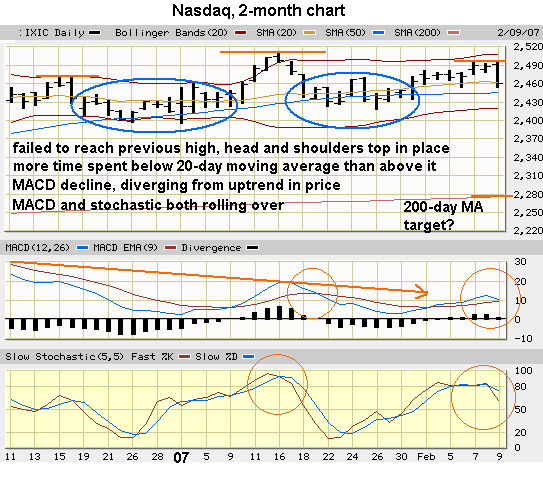

|
| weblog/wEssays archives | home | |
|
More on Pensions, and a Stock Market Correction? (February 10, 2007) First up, some reader feedback which suggests there is a growing "us" and "them" divide in the U.S.: those with publicly funded pensions and healthcare benefits, and the rest of us with Social Security, at-risk 401Ks and IRAs and Medicare when we hit 65. Reader Kevin M. highlights just how rich California public pensions can be: ! enjoyed your blog on the problem of the public pensions. A good friend of mine, who happens to be a retired Major from the San Diego Police Dept. was shocked to learn what little I make a year (I'm an Idaho State Trooper). I was stunned to learn what he makes in retirement, a little over twice what I make a year!! I remember telling Dave, "now I understand why California is going broke!"We all know California is expensive, but so is Hawaii, and their public pensions are far lower than California's. I suspect the public unions and their members fail to grasp the public's growing resentment of their "gaming the system" and other "wink-wink" legerdemain which boosts publicly funded pensions far beyond the intended scale. The unions would better serve their membership by cracking down on this kind of abuse before the outraged taxpayers take away the entire gravy train. Personally, I think it's already too late. As the recession starts biting deeply into tax revenues, municipalities will be filing bankruptcy left and right, and states will have to choose between raising taxes to fund the pensions (and thereby sparking a taxpayer rebellion) or trimming the "fat" (i.e. abuse, double-dipping, gaming of the system) from the public pensions. For more on fairness and the notion that government workers are underpaid and thus deserving of generous pensions far beyond what private sector workers could ever dream of, here is a commentary from reader Brian H. which reflects what many feel but few express: While the public employee didnít get any stock options, he also didn't work more than 40 hours. Gets paid overtime, gets a bazillion weeks of paid vacation, real health, retirement andÖÖÖ..I recall a recent open-call for applicants to a major city fire department in which hundreds of people showed up for a handful of positions. Yes, people aren't stupid; everyone wants a job with limited hours from which you can't be fired and a guaranteed generous pension after only 20 years of work. Fellow blogger Fred Roper (Satellite Sky) believes we would be better served with a true national pension plan: Social Security is / was meant to be a supplement to a pension. I think that Social Security could be converted into a pension system if we ended the Social Security and Medicare taxes limitation to the first $120K of income. Then we could fund a full pension and national health care system. The payroll taxes could be reduced for all workers since more would be contributing. The payroll tax is one which wage earners pay. I have never had anyone explain to me why the wage earner under $120K should bear so much of the financial tax burden.Thank you, readers, for your comments on a topic which I believe grows more pressing with each passing day. And before the stock market tanks next week, I wanted to predict its long-awaited "correction." Nothing rises forever, and this Bull uptrend from mid-July has extended into a 7-month stretch which is basically unprecedented in duration. (Bull markets tend to pause every few months for a 3-5% decline called a "correction" in Wall Street Speak.) All good things must pass, alas, and it now looks like the market has crested and the inevitable decline is starting. 
The general mood of the market is very bullish and very complacent--the perfect setup for a major decline. All the news has been good, month after month, with no flies in the ointment. But then what happens when all the good news is out? February is typically a poor month for the market, and uninterrupted uptrends don't last past 7 months (gee, it's been 7 months almost to the day!) It's certainly something to ponder. For more on this subject and a wide array of other topics, please visit my weblog. copyright © 2007 Charles Hugh Smith. All rights reserved in all media. I would be honored if you linked this wEssay to your site, or printed a copy for your own use. |
||
| weblog/wEssays | home |